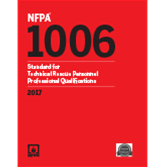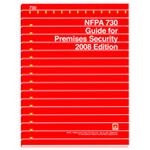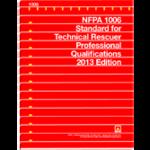NFPA (Fire) 1006
Click here to purchase
Keep pace with evolving rescue demands with criteria in the 2017 edition of NFPA 1006.
Be confident your rescue personnel are up to the task as new and emerging technologies and industry changes create new challenges — and pose unique hazards — in the field. The 2017 edition NFPA 1006: Standard for Technical Rescue Personnel Professional Qualifications updates the minimum job performance requirements to ensure that fire service and other emergency response personnel who perform such operations have the skills to work safely and effectively.
For the 2017 edition of the Standard:
- Rescuer training levels are revised from Level I and II to Awareness, Operations, and Technician, which better align with NFPA 1670: Standard on Operations and Training for Technical Search and Rescue Incidents.
- JPRs are refined for all positions within the scope of the Standard.
- Added chapters on Floodwater, Animal, Tower, Helicopter, and Watercraft Rescue provide more comprehensive coverage that addresses rescue personnel needs.
- Updated and added definitions create consistency with NFPA 1670.
Improve performance and safety for rescue personnel in a dangerous occupation.This vital Standard provides guidance for a wide range of technical rescue operations, including rope, surface water, vehicle, machinery, confined space, structural collapse, subterranean, dive, wilderness, and trench. It’s essential for anyone who responds to these types of incidents including fire, rescue, law enforcement, emergency medical services, private industry, and allied professionals.
Product Details
- Published:
- 12/01/2016
- ISBN(s):
- 9781455916269
- Number of Pages:
- 218
NFPA (Fire) 1006
Click here to purchase
Ensure that all your rescue technicians are up to the task. Apply the latest job criteria with the 2008 NFPA 1006.
NFPA 1006: Technical Rescuer Professional Qualifications establishes the minimum job performance requirements necessary for fire service and other emergency response personnel who perform technical rescue operations. These include rope rescue, surface water rescue, vehicle and machinery rescue, confined space rescue, structural collapse rescue, subterranean rescue, dive rescue, wilderness rescue, and trench rescue.
Among the significant changes in the expanded 2008 edition are:
- Water chapters have been organized by type of environment – surface, swift, dive, ice, and surf
- Division of the subterranean chapter into two chapters–Mines and Tunnels and Caves
- Each chapter has been split into two levels–Level I and Level II.
Increase effectiveness and mitigate risks in an inherently dangerous occupation. Order today and put the 2008 NFPA 1006 to work for you.
Product Details
- Published:
- 03/14/2008
- Number of Pages:
- 82
NFPA (Fire) 1006
Click here to purchase
Rescue demands are constantly evolving. Keep pace with the latest criteria in the 2013 NFPA 1006 to be sure today’s personnel are up to the task.
New and emerging technologies and industry changes including hybrid automobiles, passive energy sources such as wind turbines, and erected structures at construction sites challenge and create unique hazards for rescue personnel. The 2013 NFPA 1006: Standard for Technical Rescuer Professional Qualifications updates the minimum job performance requirements to ensure that fire service and other emergency response personnel who perform such operations have the skills to work safely and effectively.
Updates to the 2013 Standard include:
- New requirements were added to isolate and manage potentially harmful energy sources so that all hazards are identified, systems managed, proper tools and equipment are available, and operations support the tactical objective.
- In response to new power sources found in automobiles and anticipated continued developments likely to affect vehicle rescue, Chapter 10: Vehicle and Machinery Rescue (2008 edition) has been separated into two chapters. Chapter 10 is now dedicated to Vehicle Rescue and Chapter 19 supports Machinery Rescue.
- New rule was added requiring rescuers to demonstrate competency on an annual basis.
- The simple rope mechanical advantage system minimum travel distance for the load has been modified based on the response area and the discipline-specific application.
- Prerequisite knowledge and skills found in Chapter 5 were clarified based on discipline-specific job performance requirements found in Chapters 6 – 19.
- Chapter 17: Mine and Tunnel Rescue was modified and restructured to include Level I and II so that it complements the other disciplines within the document.
- Annex material including dive charts, air compression tables, and dive site diagrams was upgraded.
Boost performance and safety for personnel in an inherently dangerous occupation.
This vital Standard provides guidance for a wide range of technical rescue operations, including rope, surface water, vehicle, machinery, confined space, structural collapse, subterranean, dive, wilderness, and trench. It’s essential for anyone who responds to these types of incidents including fire, rescue, law enforcement, emergency medical services, private industry, and allied professionals.
Product Details
- Published:
- 12/17/2012
- ISBN(s):
- 9781455906017
- Number of Pages:
- 112



